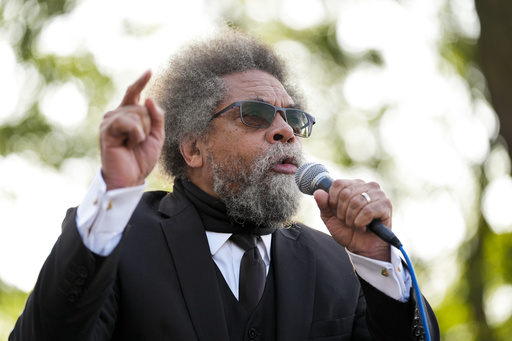HARRISBURG, Pa. — A federal judge has denied Cornel West’s request to appear on the presidential ballot in Pennsylvania, a crucial swing state, citing the imminent Election Day as a significant factor for his decision. U.S. District Judge J. Nicholas Ranjan issued the ruling late Thursday, acknowledging concerns over the way Secretary of State Al Schmidt is implementing election code limitations that affect West’s candidacy.
In his decision, Ranjan indicated that the application of laws appears to restrict access for West and other lesser-known candidates without substantial justification, which he argues might contravene the U.S. Constitution. Ranjan expressed, “The laws, as applied to him and based on the record before the court, appear to be designed to restrict ballot access to him for reasons that are not entirely weighty or tailored.”
West, a progressive academic and a professor at Union Theological Seminary in New York, is expected to pull more votes from the Democratic nominee, Vice President Kamala Harris, rather than from the Republican contender, former President Donald Trump. Notably, West’s legal team comprises individuals with strong connections to the Republican Party.
Ranjan remarked that had West initiated his case earlier, the ruling may have yielded a different outcome. He declined the request for both a temporary restraining order and a preliminary injunction.
West’s attorney, Matt Haverstick, announced plans to appeal the decision immediately. He articulated the view that “any ballot access is better than no ballot access,” expressing a willingness to settle for partial access, such as having West’s name appear on some ballots or notifications at polling locations stating his candidacy.
In response, Matt Heckel, press secretary for the Pennsylvania Department of State, stated that Ranjan’s conclusion aligns with the department’s stance but revealed that Secretary Schmidt holds a differing perspective on the enforcement of the election code. He highlighted that state courts have historically supported the Department of State in similar matters.
Heckel cautioned against the risks of late-stage legal actions, noting that courts often lack sufficient time to thoroughly review legal standards when making decisive judgments. Ranjan referenced established federal precedents that advise caution against disrupting upcoming elections without compelling justification. He noted the impracticality of reprinting ballots and retesting election machines at this late juncture, as it could increase the likelihood of errors.
The judge warned that including West on the ballot at this stage could lead to voter confusion and potential post-election disputes over how to count votes from any newly issued mail-in ballots.
West, alongside his running mate from the Justice for All Party and three voters, filed a lawsuit against Secretary Schmidt and the Department of State on September 25. They claimed that the state’s interpretation of election laws infringes on their constitutional rights to equal protection and freedom of association. A point of contention was a rule requiring that West’s presidential electors, those tasked with voting for West in the Electoral College, file candidate affidavits.
During testimony on Monday, West emphasized the importance of protecting all voices in the electoral process. He asserted that any erosion of trust in the electoral integrity ultimately contributes to broader moral and spiritual decline.
Interestingly, Ranjan was appointed to the federal bench by Trump in 2019, and all 14 Democrats in the Senate, including Harris, opposed his nomination.
